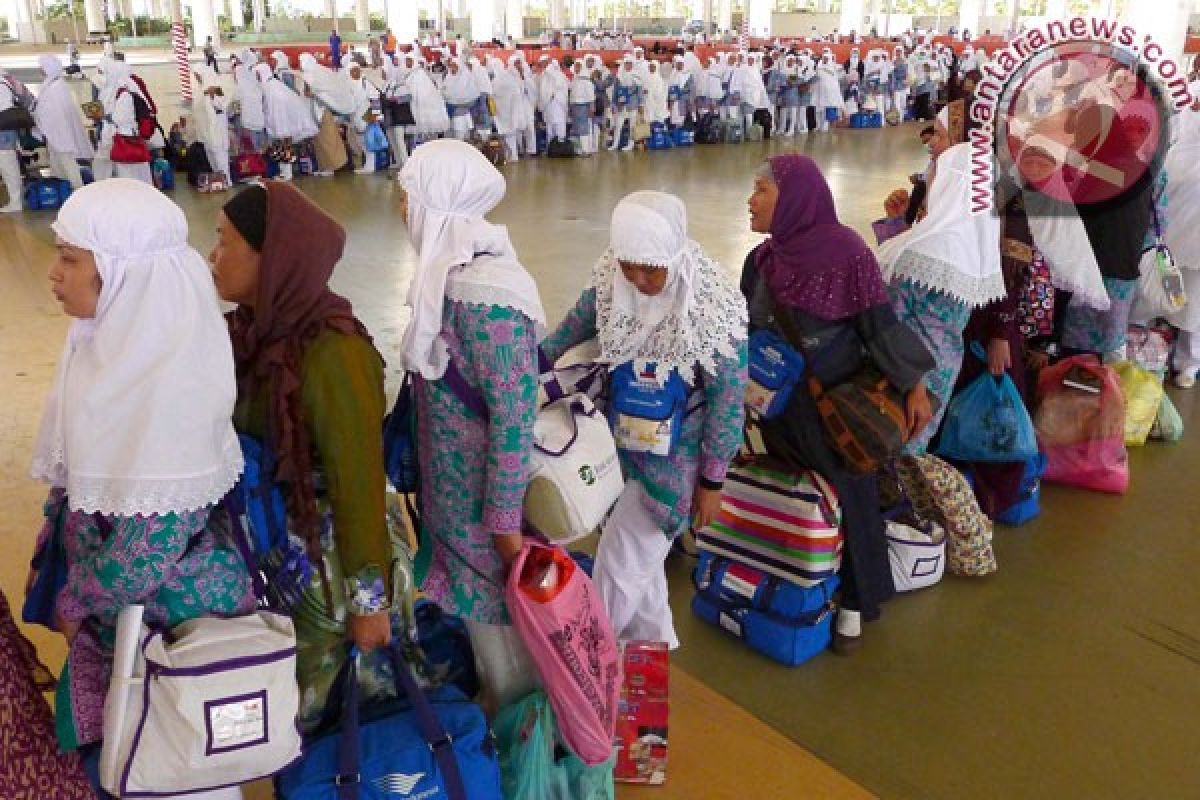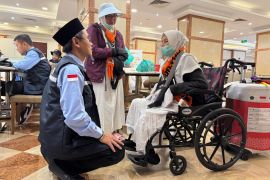"It is not easy to manage 211,000 hajj pilgrims for 38 days in the holy cities."Jakarta (ANTARA News) - More than 200,000 Indonesian hajj pilgrims will return home in stages, starting Wednesday (October 31), after completing their pilgrimage in Saudi Arabia.
The first batch of pilgrims from Medan, North Sumatra province, was scheduled to depart aboard a Garuda Indonesia airplane from King Abdul Aziz international airport in Jeddah at 4.30 am local time on Wednesday.
The pilgrims are expected to reach Polonia airport in Medan at 5 pm on the same date.
"Garuda Indonesia`s second flight, carrying pilgrims from Aceh province, was scheduled to leave King Abdul Aziz airport on Wednesday at 6.15 am local time and is expected to arrive at Banda Aceh Iskandar Muda airport on the same day at 6.30 pm local time," hajj transportation affairs official Iskandar said in Mecca on Tuesday.
The second flight will be followed by another Garuda airplane, which will carry pilgrims to Lombok, West Nusa Tenggara (NTB) province.
"The third flight, which was scheduled to leave King Abdul Aziz international airport at 7.15 am local time on Wednesday, is expected to arrive in Lombok at 11.30 pm local time," Iskandar stated.
Many hajj pilgrims from other countries have left their Maktabs (temporary shelters) in Mina after completing their pilgrimage and have returned to their accommodations in Mecca.
On Thursday (October 25), more than 3 million pilgrims from all over the world gathered at the Arafah field to perform the Wuquf, which involves praying to Allah at the Arafah for several hours.
Doing Wuquf at the Arafah is a must for all Muslims, including the ailing ones, while performing the annual hajj pilgrimage, because Wuquf is considered to be the most important part of the pilgrimage.
Therefore, some 250 ailing Indonesian hajj pilgrims were transported from Mecca to the Arafah on Wednesday (October 24).
The Arafah is approximately 25 kilometres from Mecca, and most hajj pilgrims head to the Arafah by bus. The rest, however, reach there by foot.
After doing the Wuquf, the pilgrims left for Mina transiting through Muzdalifah, a hilly land where they picked dozens of pebbles to throw at "Jumrah Aqabah" (one of a series of ritual acts that must be performed in the Hajj), before heading to Al-Haram grand mosque in Mecca to perform the "Tawaf Ifadah" (by circling the Ka`bah).
Tawaf Ifadah must be performed by every pilgrim before leaving for home.
Before that, however, during their stay in Mina, all pilgrims stoned the three Jumrahs (concrete pillars), namely Jumrah Ula, Wustha and the Aqabah.
The day of stoning the three Jumrahs is called "Nafar Awal". The pilgrims who stone the three Jumrahs for two days after the Idul Adha are considered to have successfully performed the "Nafar Tsani".
This year, the number of Indonesian hajj pilgrims to Saudi Arabia reached 211,000, accounting for a big part of the total number of hajj pilgrims to Saudi Arabia from across the world.
Indonesia, the world`s largest Muslim country, sends the highest number of hajj pilgrims to the Middle East every year.
Muslims who can afford a trip to Saudi Arabia are obligated under Islam to perform hajj pilgrimage at least once during their lifetime.
More than 160 Indonesians have died in Saudi Arabia since the first batch of hajj pilgrims arrived aboard chartered flights in the Holy Land on September 21.
As many as 388 ailing pilgrims are still undergoing treatment at the Indonesian hajj pilgrim health centre in Mecca.
Meanwhile, Indonesian Religious Affairs Minister Suryadharma Ali said in Mecca on Tuesday that the pilgrimage services provided this year were better than previous years.
"After all, it is not easy to manage 211,000 hajj pilgrims for 38 days in the holy cities of Mecca and Medina," he stated.
Suryadharma noted that all Indonesian hajj pilgrims were properly accommodated.
"It is not a simple job," he said. The minister praised Indonesian hajj affairs personnel for providing the pilgrims with satisfactory services.
(T.B003/INE/KR-BSR/F001)
Reporter: by Bustanuddin
Editor: Priyambodo RH
Copyright © ANTARA 2012












